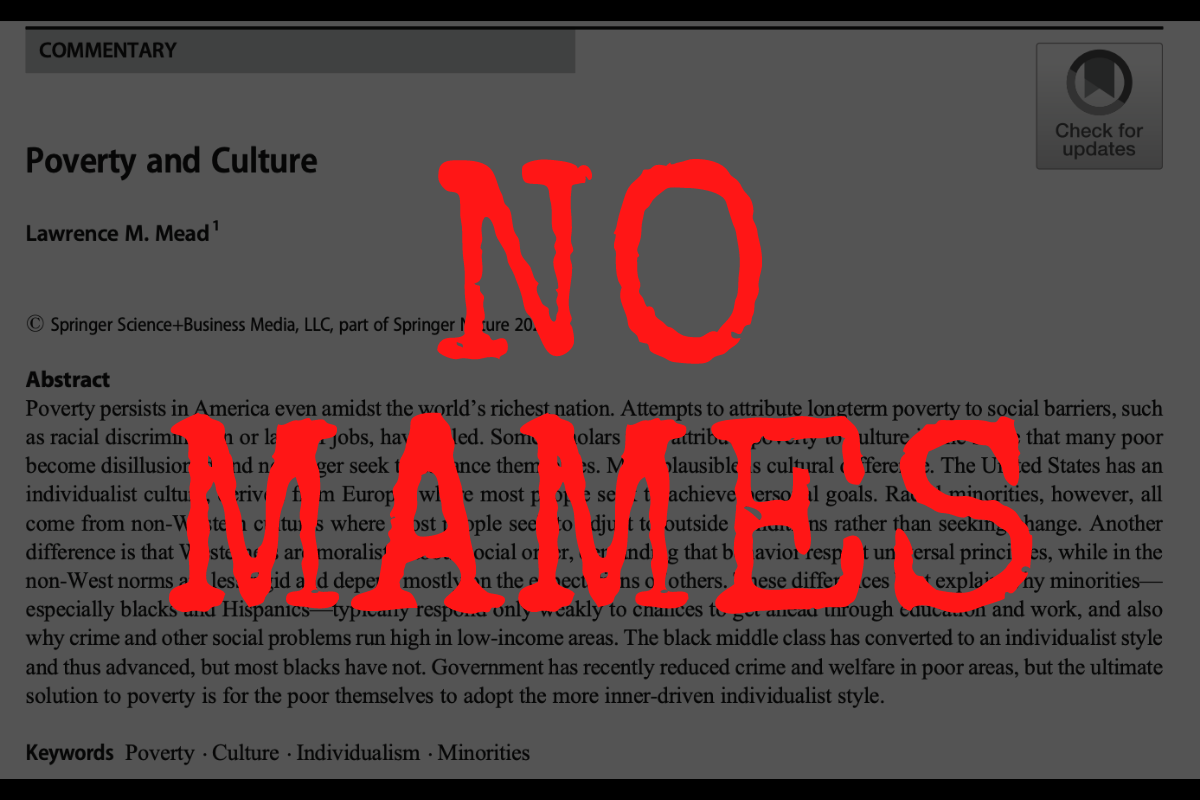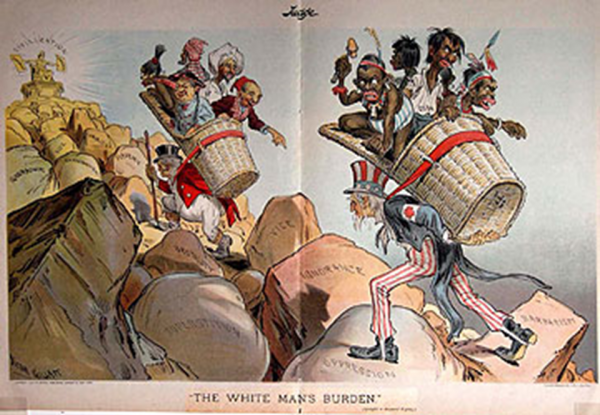

Lawrence Mead, a professor in the Department of Politics at New York University, recently published a commentary entitled “Culture and Poverty” in the journal Society, a Springer publication. In his piece, Meads revives racist narratives blaming poverty on culture, more specifically, Black and “Hispanic” culture. I first knew of the article after seeing a Twitter storm started byDr. Davíd G. Martínez, who called the paper out because of its explicit and coded racism. Martínez’s condemnation was strong indeed. A open letter has been making the rounds for the past few days, inviting educators, advocates, and scholars to renounce the Meads article. Other letters have also appeared.
After reading what Mead wrote, two things are obvious to me. One, those denouncing the paper are completely justified; and two; the journal’s editorial board and the peer reviewers that greenlit the piece (if there were any) did not follow the most basic academic standards.
Mead’s discussion of “culture” is so outdated and mistaken that one wonders if he has read anything in the last 60 years. For example, take his assertion that cultural difference is the most plausible explanation for persistent poverty among “minorities” (which he describes as Blacks and Hispanics). Never mind that the term “minorities” is rarely used anymore in academia and that even the private sector prefers the term “underrepresented,” more important is that he uses “culture” as a coded word for “race.”
Anyone who has been through high school understands that culture is alive and that it changes constantly. Culture is not fixed nor has anything to do with DNA. We are not born with an imbedded culture. We are instead born within a culture or cultures and exposed to many others through our life. Culture, simply put, is learned behavior. This is so basic that to read Mead arguing that the United States “…has an individualist culture, derived from Europe, where most people seek to achieve personal goals. Racial minorities, however, all come from non-Western cultures where most people seek to adjust to outside conditions rather than seeking change” is completely dumbfounding.
As I mentioned, culture changes constantly, so even if Mead was right about the generalizations he makes about Western and non-Western cultures (and he is not), it would not matter anyway because the United States is not receiving a constant influx of fresh White Anglo-Saxon Protestants (Mead’s favorite folks), who according to him, provided the United States with a sense of universal morality and personal responsibility that non-Westerners simply don’t have.
This is wrong in so many ways it is hard to focus on which one is the worst offense. The broad unsubstantiated generalizations about Western and non-Wester cultures? The poor grasp of history? Ignoring non-WASP groups instrumental in the forging of the United States—including other Westerners, non-Westerners and Native Peoples? Or maybe let’s focus on how racist his discussion of culture really os.
Every time Mead mentions culture, he means race—and not as a social construct but as a biological determinator of people’s attributes and shortcomings. To him, people are born with cultural traits determined by biology. This is late 1800s early 1900s pseudo-science. And all of it has been debunked yet Mead has repackaged it as part of the also debunked “culture of poverty” narrative.
So to believe Mead’s arguments, one must accept that culture comes in the DNA (which is racist to begin with, but also very, very, very ignorant, actually, downright dumb). That translates into African Americans being born in the United States for generations but with a Kenyan, or Hutu, or Congolese DNA-embedded culture. He applies the same twisted logic to Latinos—who he calls Hispanics. Even the word “Hispanic” is a Western invention for those identifying as having ancestors from Spain (which, last time we checked, was also part of the West). Mead’s logic also requires you to believe that the culture of African Americans and Latinos after being born in the United States for generations, for centuries, remains non-Western.
But there is some truth to his poorly argued and unsubstantiated opinions. He proves the point that the global structures designed by Europeans after 1492 and eventually by Anglo Americans are designed to marginalize and oppress those who are perceived as being the other, those who are different. If anything, Mead proves that the modern global world’s main building block is structural racism and white privilege. How else can we have a present-day NYU professor writing a piece that lacks evidence, revives pseudo-scientific racist discourses debunked ages ago, ignores the most basic academic standards, and makes reference to his own work to legitimize his assertions? This wouldn’t even earn a D- for first-year undergraduate in an intro class.
But to answer the question, Mead can write this racist garbage because academia remains a very racist and white-dominated place. He is not reinventing the wheel. Instead he is following on a long tradition of racists who taught middle-class and affluent Whites (the future leaders of the country) that the White man had been burdened by being chosen by God to have special biological attributes that made him superior. Thus, it was the White Man’s Burden to bring light into the world and end barbarity. It was the White Anglo-Saxon Protestant’s duty to try and mold the savages on HIS own image—even if they could never be as good as him. What Mead is reviving was known as Civilizational Imperialism of the late 1800s and early 1900s. It was the main rationale for Europeans, but especially for Britain and the United States’ Anglo-Americans to explain why they governed and controlled non-Whites throughout the world.


The most important issue here is that this was not considered pseudo-science at all. This was considered mainstream path-breaking science and taught in the ivory towers of the world’s most prestigious colleges. For example, take John Fiske, a philosopher, historian and evolutionist who among many things taught at Harvard in the 1870s. He promoted the vision of history as a dualistic struggle of worldwide proportions between conquering civilization and retreating barbarism. Fiske reconciled the traditional religious belief in creation with evolution. The consequence was a firm belief on the dominion of advanced races —of which the Anglo-Saxon (of course) was the most advanced— over lesser ones, because “God” had ordained it.
Or take John Burges, founder of Political Sciences at Columbia University and mentor of Theodore Roosevelt, who believed that the civilized races, the various branches of the Teutonic races (the Whitest of the Whites), had a “claim upon the uncivilized populations as well as duty towards them, and that claim is that they shall become civilized.” This version of survival of the fittest is called Aryanism or Teutonism, and it was widely invoked by European and Anglo-American imperialists in the late 1800s and early 1900s to explain their imperial policies.


All these ideas led into Social Darwinism and Eugenics—and to abuse whole groups of peoples, population control, and even total extermination of “cultures” and “races” deemed too degraded to be redeemed by the White Man. And yes, they led to the Holocaust in World War II but there were others before and several after—and here we are in 2020. That is what Mead is reviving—the teaching of hatred of other “cultures” which according to him, are not apt for this modern world unless they emulate and adopt their masters’ ways.
From there, Mead tell us that the differences between Westerners and non-Westerners “…best explain why minorities —especially blacks and Hispanics— typically respond only weakly to chances to get ahead through education and work, and also why crime and other social problems run high in low-income areas.” Never mind that he ignores documented structural disadvantages for these two groups to attain a first education, but he is also ignoring this communities’ advances despite everything that is against thy making it.
He finally prescribes that we stop acting Black and Hispanic, thought not exactly in those words: “The black middle class has converted to an individualist style and thus advanced, but most blacks have not. Government has recently reduced crime and welfare in poor areas, but the ultimate solution to poverty is for the poor themselves to adopt the more inner-driven individualist style.”
Thus, if we want to get ahead in life, we have to embrace the “culture” and way of life of true Westerners, true Americans. We have to embrace the White Anglo-Saxon Protestant archetype. And Mead is not shy about it either. He uses the pronoun “us” so many times to position himself as a Westerner with the right God-given attributes, and as model of perfection that it would be funny if it wasn’t sickening. Not only he is writing an US versus THEM narrative (a capital sin in academia) but he does it while recreating a racial hierarchy (which he calls culture) and painting the world in the most Manichean of ways—light versus darkness, good versus evil, white versus Black (and Latino).
Meads coded his neo-Social Darwinism, his Neo-Eugenics, as “culture” (obviously meaning race) when he argued that the social structures of the United States do not go along with non-Westerners’ beliefs (“Blacks” and “Hispanics”), and he is inadvertently right. But it is not that Latinos and Blacks are being held back because of their culture or race but because the system only rewards them when they act white (if at all). Thanks, but no thanks—I will keep acting Latino and Puerto Rican.
As for Mead, he is the best example, the poster boy of White Privilege in Academia. His most non-academic production (a very dumb and racist rant) gets published without question and he sits tenured at an institution like NYU. It is indeed a tragedy that we have racists like Mead teaching bigoted hateful ideologies to generation after generation of students. It is even more tragic that he is not the only one, and that more than likely, none of them will see their careers negatively affected by their open bigotry, racism, and prejudice against Blacks and Latinos.
It is time to #DecolonizeAcademia.
***
Harry Franqui-Rivera, Ph.D. is historian and author of Soldiers of the Nation: Military Service and Modern Puerto Rico, 1868-1952. He tweets from @hfranqui.



everyone I know believes it to be a cultural problem. and im in a big blue city. if a person comes to the US, doesn’t learn the language, has no remarkable skills, no formal education, and than has 3 kids, lives in a home where maybe only one person is working, they are going to be poor. it has nothing to do with being oppressed. if education and discipline is not the priority in the home, the child will not thrive. this is why Asians and people of Indian descent also do very well in the US.
Culture is code for race as indicated above.